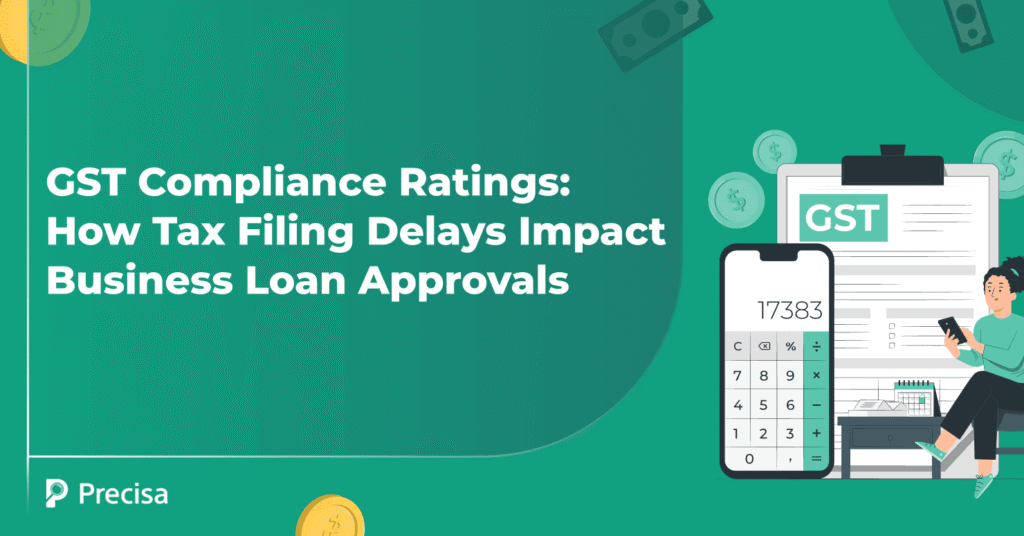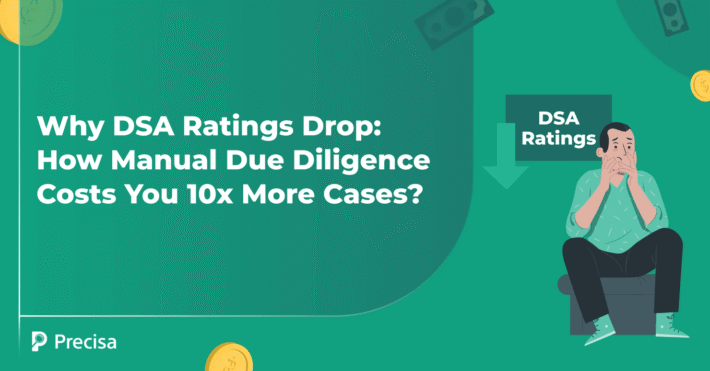GST Compliance Ratings: How Tax Filing Delays Impact Business Loan Approvals

The Goods and Services Tax (GST) regime in India emphasises transparency and accountability and has reshaped how financial institutions assess businesses’ creditworthiness. GST compliance, especially timely and accurate tax filing, has become a critical factor in loan approvals for Indian businesses. Lenders now view compliance as a primary indicator of creditworthiness and risk. Delayed tax filing and inconsistent GST reporting immediately increase a lender’s perception of risk, often resulting in loan denials or less favourable lending terms.
GST compliance ratings enable lenders to better assess creditworthiness by providing a transparent view of a business’s tax behaviour. Lenders can overcome the challenges posed by limited financial histories, making it easier to evaluate MSMEs and narrow the ₹30 lakh crore credit gap that this segment faces.
This article explains why effective GST management is not merely a legal formality but a crucial factor in securing business funding and favourable loan terms.
GST Compliance Rating: What Do They Signify
GST compliance rating in India does not function like a formal score provided by credit bureaus such as CIBIL. Instead, it refers to an evaluation of a taxpayer’s adherence to GST regulations, reflecting a business’s commitment to timely and accurate GST filings. While the GST Council hasn’t mandated a universal compliance scoring framework, forward-thinking lenders have recognised the need for systematic evaluation. This is where advanced analytics platforms become essential. Precisa’s GSTR Analyser provides a comprehensive GST compliance assessment by analysing filing consistency, detecting cyclical transactions, and identifying anomalies to generate an overall creditworthiness score.
Lenders increasingly rely on technology that analyses GST data alongside financial metrics to build internal credit assessments. This approach provides far more nuanced risk evaluation than traditional methods.
Modern analytics platforms address this by processing GST data alongside bank statements to create comprehensive risk profiles. For example, when a lender receives a loan application, automated analysis can instantly flag discrepancies between reported GST turnover and actual bank deposits, revealing potential red flags that manual review might miss.
Precisa’s GSTR Analyser performs this cross-analysis automatically, detecting cyclical transactions and anomalies whilst generating a unified creditworthiness score.
How GST Compliance Influences Creditworthiness?
Understanding what compliance ratings represent is one thing. But why do they matter so much to lenders? Let’s examine the specific ways GST compliance influences credit decisions.
Transparency and Reliability
GST returns provide a comprehensive and verified snapshot of a business’s sales, purchases, and tax liability. Lenders can base their decision on data such as reported turnover and profitability. A consistent track record of timely and accurate GST filings demonstrates a reliable business operation, while tax filing delays indicate the contrary.
Lenders can correlate the data with other sources, which can sometimes reveal fraudulent and fictitious invoicing. FIs can get an accurate picture as GST filings show what a business reports to the government, while bank statements show what truly happens on the ground. When the two diverge, it exposes cracks and is a red flag in business lending.
With GST data, lenders have access to:
Verified Proof of Income and Turnover
Annual turnover or income is a crucial aspect in determining a business’s loan eligibility, especially for unsecured business loans. GST returns provide lenders with reliable proof of business volume, annual turnover, and a consistent revenue stream. Lenders find this data far more credible than self-reported figures or traditional financial statements, which might not always reflect real-time activity.
A Strong Cash Flow Indicator

Regular GST payments also reflect a healthy cash flow management system, which is a crucial indicator of a business’s liquidity and ability to meet debt obligations. Lenders can analyse the GST data to understand working capital cycles; organisations that exhibit tax filing delays appear risky to lenders, while those that manage their GST obligations regularly are viewed positively by lenders. Precisa GST Analyser aids financial institutions with credit risk assessment for flow-based lending.
Indicates Financial Discipline and Management
Regular and timely filing of GST returns is an indicator that the business is well-managed, operates within regulatory guidelines, and maintains organised financial records.
GST compliance also reveals how well a business manages its affairs. Consistent, accurate filings signal sound management, whilst inaccuracies and delays raise questions about internal controls. Businesses that file consistent, timely GST returns help build trust with suppliers, customers, and financial institutions. Delays or inconsistencies can lead to vendors refusing business to avoid issues with their own ITC claims, which can hamper business operations and interrupt cash flows. Any disruption in operations can impact loan repayments, and lenders want to avoid lending to businesses where they anticipate disruption in regular cash inflows.
Offers A Comprehensive Risk Assessment
Lenders use integration tools to access a business’s GST data directly from the GST portal for cash flow analysis and assessing operational stability. The GSTR-3B provides a consolidated view of all the transactions and taxes paid in a particular month, providing a holistic view of a business’s activities for that period. This, along with tools such as bank statement analysis, provides lenders with a more comprehensive and nuanced credit health assessment of a business, enabling them to make more informed decisions and improve their portfolio quality.
A͏I͏-͏p͏o͏w͏ered re͏c͏on͏ciliati͏o͏n pl͏atfo͏rms like the GSTR Analysis Tool from Precisa ca͏n proce͏͏s͏s͏ la͏r͏g͏e͏ v͏͏ol͏umes͏ of data fr͏om͏ ͏GST ͏r͏e͏tur͏͏͏͏ns a͏n͏͏d bank s͏͏tatements, i͏n͏s͏͏t͏antly͏ flag͏ging͏ i͏nco͏n͏͏s͏is͏te͏nci͏es and offering a more reliable risk assessment for lenders.
GSTR analysis provides valuable insights after loan disbursement, too; it identifies anomalies and irregular patterns in financial data, serving as an early warning system. Lenders can take timely and preemptive action to address potential issues before they become larger problems and lead to default.
Facilitates Loans at Favourable Terms
Borrowers with good GST compliance ratings can access credit on better terms, as they are perceived to be more creditworthy. They can access loans at lower rates and flexible repayment terms, supporting them in their business growth. Strong GST compliance records enable businesses, particularly MSMEs, to access unsecured or collateral-free loans, as their compliance history serves as a substitute for traditional collateral.
Conclusion
To sum it up, maintaining robust GST compliance, apart from being a regulatory obligation, offers a strategic advantage for businesses seeking credit. Avoiding tax filing delays and inaccuracies helps a business enhance its credibility in the eyes of lenders, open doors to better loan terms, and foster sustainable growth.
Are you looking for a technological partner to help you make informed lending decisions? Precisa’s GSTR Analyser is the perfect choice. With over 1,000 clients across 25+ countries, Precisa’s capabilities have been proven across diverse business scenarios and regulatory environments.
Unlike manual GST analysis that can take days and miss subtle patterns, Precisa’s automated platform processes complex data in minutes, detecting anomalies that would escape human review. It identifies inconsistencies and anomalies in GST filings whilst providing a 360-degree view of a business’s financial health, ensuring more robust risk assessment and better outcomes for both borrowers and lenders.
Ready to transform your credit assessment process with comprehensive GST analysis? See how Precisa’s GSTR Analyser delivers deeper insights and more accurate risk evaluation → Book a Free Trial Now!



